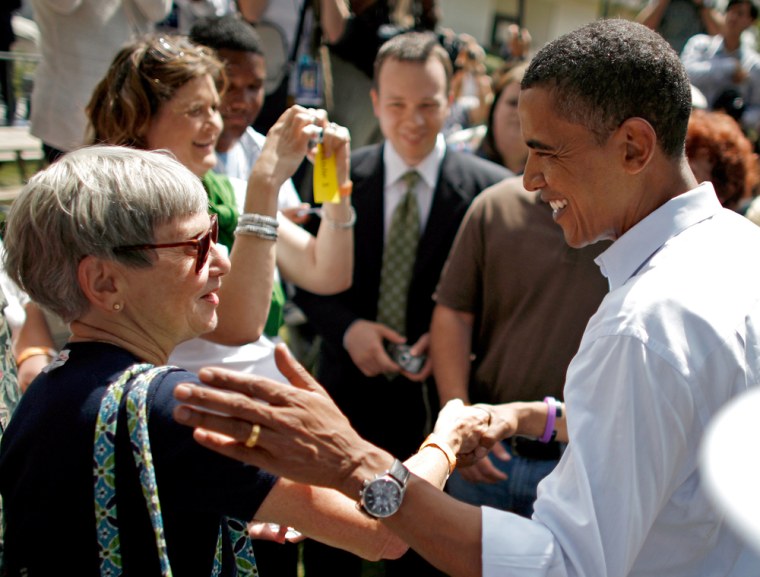DENVER — Every analyst and pollster has their favorite demographic slice of the electorate pie.
And it's always the one they consider absolutely crucial to the outcome on Nov. 4.
Some say it's Catholics, some say it’s single women, and still some others say it's rural voters in Midwestern states like Missouri. And of course, don't forget about voters over the age of 65.
For organized labor, the decisive demographic consists of rank-and-file workers — those who belong to a union or who labor leaders think ought to belong to a union.
So far, Obama has not run a hard-edged, aggressively populist campaign to woo these voters.
Nonetheless, a survey conducted by Democratic pollster Celinda Lake indicates that Obama has a huge 19-point lead over Sen. John McCain among such potential voters.
Could workers swing away from Obama?
But Lake said these non-supervisory workers “are very much swing voters — particularly white working-class voters. Democrats have lost them in some elections.”
She implied that while Obama can’t take them for granted, he has the ability to bulk up his lead.
"If he engages more aggressively and in a more populist way in this economic message, he has the potential to make huge inroads here,” she said at convention briefing in Denver.
Lake said, "The race is not over yet. The race is even among white working Americans and that will continue to be a battleground until the day before the election.”
Lake interviewed 700 non-supervisory workers from Aug. 13 to Aug. 19. She focused on workers who aren’t managers, executives, professionals or small business owners.
Her polling was commissioned by the labor union coalition, Change to Win.
Obama ahead so why should Dems fret?
So, if you’re a labor union Democrat, and if Obama is ahead among non-supervisory workers, why worry?
One possibility is that Obama might win on Election Day without running a hard-edged, aggressively populist campaign — and he might not need organized labor as much as it would like to be needed.
Pollster Lake makes the sensible point that a robust performance by Obama among one demographic in which he’s already leading could help offset weaknesses in other groups.
Case in point: If Obama can do even better among non-supervisory workers than current polling indicates, it’ll help offset his lackluster performance among voters over the age of 65.
“Seniors are his worst voting group,” Lake noted.
“It’s directly proportional to age,” meaning the older the voter, the less likely he or she is to say he or she would vote for Obama.
Lake didn’t limit her survey to registered voters, but instead cast her polling net widely among non-supervisory workers — the idea being that some of them to could still be persuaded to register and vote on Election Day.
Anna Burger, a top official of the Service Employees International Union, said, “Obama has a strong economic message — but I don’t think it has been heard enough in the community. He needs to do more.”
Union ad warns of foreign investors
It’s noteworthy that SEIU has been airing a television ad that ominously warns of foreign investors buying stakes in U.S.-based companies. It's an ad that is far harsher than anything the Obama campaign has aired and is a world apart from its usual uplifting, non-confrontational campaign themes.
Will this become a part of the Obama message too? “I don’t know that he’s gone that far yet — but we’ll see where he goes next week,” Burger said.
But is it a risky strategy if Obama starts sounding hard-edged, populist and anti-foreign investment?
Would such rhetoric from Obama alienate managers, executives, professionals and small business owners who might otherwise be inclined to vote for him?
Lake doesn't think so, but says it will be worth listening closely to the tone of the Obama ads and speeches come October.
Even if Obama is elected, there’s the danger, from organized labor’s point of view, that he or Congress might not press the economic agenda as forcefully as SEIU and other unions might want.
As an insurance policy, SEIU will keep its organizers dispersed around the country after the election just to make sure.
“We think it’s really important to make sure that what we try to accomplish on Election Day actually gets accomplished,” Burger said.
“So we will have as many members in the field after Election Day as we do before Election Day. We think the critical time is between January and June in terms of being able to move forward on critical issues such as health care for every man woman and child in America.”
She added, “We’ve said that we have his back. We’re going to be out there making sure senators and Congress members understand the critical issues they need to vote on come January, February and March.”
